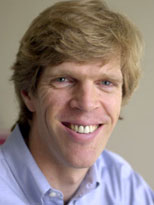Keynotes
Wednesday,
March 17th
March 17th
Rod Johnson
Thursday,
March 18th
March 18th
Martin Odersky
AOP in the wild: Killer applications and why AOP is perfect for the cloud
Rod Johnson, Creator of Spring & Best Selling Author
Wednesday, March 17th

Biography: Rod Johnson is one of the world's leading authorities on Java and J2EE development. He is a best-selling author, experienced consultant, and open source developer, as well as a popular conference speaker. Rod's best-selling Expert One-on-One J2EE Design and Development (2002) was one of the most influential books ever published on J2EE. The sequel, J2EE without EJB (July 2004, with Juergen Hoeller), has proven almost equally significant, establishing a comprehensive vision for lightweight, post-EJB J2EE development.
Rod is the founder of the Spring Framework, which began from code published with Expert One-on-One J2EE Design and Development. Along with Juergen Hoeller, he continues to lead the development of Spring. He regularly speaks at conferences in the US, Europe and Asia, including the ServerSide Symposium (2003, 2004 and 2005), JavaPolis (Europe's leading Java conference), and JAOO (2004). Engagements in 2005 include two presentations at JavaOne 2005 and a keynote at the JavaWorld 2005 conference (Tokyo, June). Rod serves in the JCP on the Expert Groups defining the Servlet 2.4 and JDO 2.0 specifications.
Rod continues to be actively involved in client projects at Interface21, as well as Spring development, writing and evangelism.
Redesigning Scala's Collections
A Case Study in Abstraction and Modularity
A Case Study in Abstraction and Modularity
Martin Odersky, Professor, EPFL
Thursday, March 18th
The talk reports on our experiences in redesigning Scala's collection libraries, focussing on the role that type systems play in keeping software architectures coherent over time. Type systems can make software architecture more explicit but, if they are too weak, can also cause code duplication. I demonstrate some of the negative effects of such duplication for API coherence, and show how it can be avoided using two of Scala's type constructions: higher-kinded types and implicit parameters and conversions.

Biography: Martin Odersky is a professor in the programming research group at EPFL. Previously he has held positions at IBM Research, Yale University, University of Karlsruhe and University of South Australia, after having obtained his doctorate in 1989 from ETH Zuerich. He is associate editor of the Journal of Functional Programming and member of IFIP WG 2.8. He is also member of the expert groups JSR 14 and JSR 65 on the future evolution of the Java programming language. Martin's interests cover fundamental as well as applied aspects of programming languages. They include semantics, type systems, programming language design, and compiler construction.
Sociological Aspects of Aspect-Oriented Programming
Martin Rinard, Professor, MIT
Friday, March 19th

Biography: Martin Rinard is a Professor in the MIT Department of Electrical Engineering and Computer Science and a member of the MIT Computer Science and Artificial Intelligence Laboratory. His research interests have included parallel and distributed computing, programming languages, program analysis, program verification, and software engineering. Much of his current research focuses on techniques that enable software systems to execute successfully in spite of the presence of errors. Results in this area include acceptability-oriented computing (a framework for ensuring that software systems satisfy basic acceptability properties), failure-oblivious computing (a technique for enabling programs to execute successfully through otherwise fatal memory addressing errors), and a technique for providing probabilistic bounds on the accuracy of program outputs in the presence of failures.